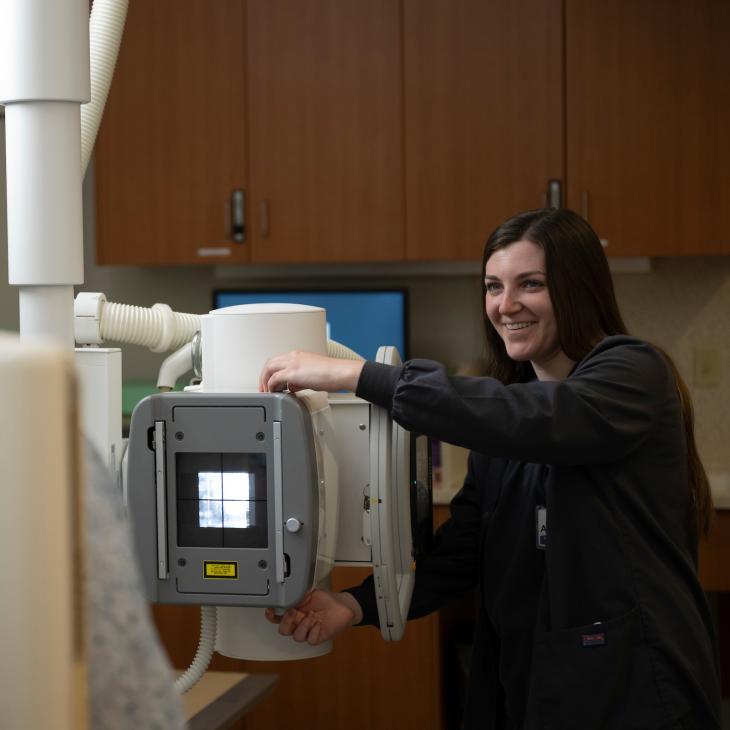Medical Imaging


Use cutting-edge technology to help diagnose and treat patients.
York College of Pennsylvania’s Bachelor of Science (BS) in Medical Imaging degree program helps students embark on rewarding healthcare careers. From learning how to operate an x-ray theater to using technical equipment, students in the Medical Imaging program become experts in the imaging sciences, develop a high standard of patient care, and learn alongside working professionals while preparing to enter an in-demand, high-compensation field.
York’s degree in Medical Imaging includes invaluable clinical experience, with three professional tracks in Nuclear Medicine Technology (NMT), Radiography, and Diagnostic Medical Sonography. The program builds a foundation of knowledge needed to procure fulfilling work and pursue further certification or education in practice specialties.
About the BS in Medical Imaging
Medical Imaging Degree Requirements
Medical Imaging majors can tailor their degree to their desired professional pathway: Radiography, Nuclear Medicine Technology, or Diagnostic Medical Sonography. Including preliminary coursework at York and clinical experience at top locations, the Medical Imaging program can be completed in as few as four years.
Core requirements of the Medical Imaging degree at York College of Pennsylvania include:
- 63-64 course credits in Medical Imaging coursework (around four semesters)
- Clinical rotations in either Radiography, Nuclear Medicine Technology, or Diagnostic Medical Sonography (around four to five semesters)
Before entering your clinical years, you may take courses at York including:
- HSC 105: Medical Terminology
- MAT 111: Critical Thinking and Problem Solving in Math
- BIO 150/151: Molecular Biology
- CHM 122: Principles of General and Organic Chemistry
- BIO 220/222: Anatomy and Physiology
- FCO 215: Technical and Scientific Communications
Earn a Bachelor of Science in Medical Imaging at York College of Pennsylvania
York College of Pennsylvania’s Bachelor of Science in Medical Imaging degree program provides students with the foundation of knowledge needed to pursue fulfilling work in the imaging sciences, with clinical experience, expert training, and flexible career tracks in Nuclear Medicine Technology, Diagnostic Medical Sonography, and Radiology.
Get closer to your career in a rewarding healthcare field. Learn about undergraduate admissions and request more information.
Ready to apply? Begin your application.
Train for In-Demand Healthcare Careers
As modern medicine continues to improve, sustained or repeated imaging is how medical professionals monitor progress and investigate concerns. Doctors and nurses are more aware of and able to treat a greater range of conditions, resulting in a growing need for imaging professionals who can assist in the diagnostic and treatment process.
Many factors are influencing the growing demand for medical imaging professionals, and experts predict this field will continue to see growth in the coming years. According to the Bureau of Labor Statistics (BLS), MRI and radiologic technologists will experience 6% growth in employment from 2021 to 2031. Some fields, such as oncology, have an even higher need for trained professionals, and employers may even offer signing bonuses to new staff.
York’s flexible Medical Imaging program prepares for entry-level technologist careers in nuclear medicine, radiology, and more, including roles like:
- Nuclear Medicine Technician
- MRI Technician
- CT Technician
- Mammography Technician
- X-Ray Technician
- Sonography Technician
- Radiation Therapist
Focus your training on areas you care about and pursue a career with high job security and work-life balance.
Earn Higher Salaries and Prepare for Advanced Imaging Careers
Electing to pursue a bachelor’s degree in Medical Imaging is ideal for students looking for in-depth specialized training and who may pursue leadership roles in the future. It can also be the first step on an educational journey that includes further study in master’s or professional programs.
- Radiography technician—$71,202
- Nuclear medicine technician—$85,646
A comprehensive education and exposure to relevant technology are hallmarks of York’s Medical Imaging degree, allowing graduates to earn higher starting salaries than professionals who hold a certificate or associate degree alone.
Clinical Rotation Experience
After completing two or three years of coursework at York College of Pennsylvania, students in good academic standing then complete a final year or two of clinical rotations in a hospital setting.
During Nuclear Medicine, Radiology, or Diagnostic Medical Sonography clinical rotations, you'll learn on the job from trained technologists and educators, working directly with patients and specialty equipment. Train in live healthcare environments and translate your coursework into care in top clinical placement locations, including:
- Pennsylvania College of Nursing and Health Sciences (NMT)
- Johns Hopkins School of Medical Imaging (NMT and RAD)
- WellSpan York Hospital (RAD)
Get Hands-On With Imaging Technology
As you complete courses for your Medical Imaging degree, you'll work hands-on with the latest laboratory technology. Clinical experiences provide students with opportunities to interact with patients in the real world, using common medical imaging technology to observe and understand the body’s internal structures and functions. Learn about digital radiography, tomography, ultrasound and MRI machines, and more.
Learn From Experienced Faculty and Industry Professionals
Medical Imaging instructors at York connect with students and provide invaluable mentorship and guidance. Then, students work as colleagues alongside active technicians and healthcare managers in their clinical experience.
These connections allow imaging professionals to pass down their working knowledge and provide guidance to the new generation of imaging technicians. At York College, students are given the opportunity to build confidence and build a professional network because we believe mentorship is a crucial component of healthcare training.
Campus Community and Activities
Before you begin your off-campus medical imaging clinicals, you’ll experience the vibrant and close-knit community of York. From academic support to personal enrichment, York’s student development and community engagement opportunities foster an environment that helps you prepare for the real world while enjoying your time in college.
Students in the Medical Imaging degree program can find professional support and foster new peer connections by joining one of our over 100 clubs or organizations, such as the Pre-Medical and Allied Health Society.
Skills That Fuel Medical Careers
Students in the Medical Imaging degree program at York College of Pennsylvania learn and practice the skills that make them better care providers, collaborators, and critical thinkers in the workforce.
You'll become familiar with both the technical and interpersonal aspects of clinical medicine and imaging:
- Proficiency in the operation and maintenance of advanced imaging equipment and machines
- How to draw upon the knowledge of anatomy and physiology to interpret and analyze medical images of different origins
- Ability to empathetically connect with patients and care for them with respect and sensitivity
- Comprehensive safety practices protecting patients and healthcare workers from radiation and potentially hazardous materials
- How to productively collaborate with other care providers, including physicians, nurses, and radiologists to improve patient experience
Prepare for Careers in Medical Imaging Management and Beyond
Jumpstart a career in an in-demand healthcare field and gain the well-rounded education necessary to progress to supervisory roles in the future. If you want to maximize your skills to make a larger impact, educate other professionals or the community, and promote health for more patients, earning a bachelor’s degree in Medical Imaging at York College of Pennsylvania positions you to succeed in your future endeavors.
Medical Imaging Courses
Your class schedule will include core courses for your major, Gen Next general education classes, and electives.
| Course Name | Course Code | Credits |
|---|---|---|
| Medical Terminology | HSC 105 | 3 Credits |
| Introduction to Molecular Biology | BIO 150/151 | 4 Credits |
| Principles of General and Organic Chemistry | CHM 122 | 4 Credits |
| Anatomy and Physiology I | BIO 220 | 4 Credits |
| Technical and Scientific Communications | FCO 215 | 3 Credits |
Careers in Medical Imaging
A bachelor's degree in Medical Imaging opens up a variety of career opportunities. Some of your options may include:
Mammography Technician
MRI Technician
Nuclear Medicine Technician
Radiation Therapist
Sonography Technician
X-Ray Technician
Frequently Asked Questions
Earning a bachelor’s degree in Medical Imaging opens career opportunities in many subfields of healthcare, from nuclear medicine technology to diagnostic medical sonography. Graduates can find work as technologists as well as technicians, who typically have more training and education than staff in technologist positions. The option to earn further certifications in fields like mammography, CT, and more leads to more opportunities.
With further experience in the workforce, bachelor’s-educated medical imaging professionals can advance to specialized roles, supervisory or directorial positions, and roles managing imaging departments and teams. Other advanced career pathways include education and research, where you can become a clinical instructor, educator, or researcher.
Sonographers, MRI technicians, radiology technicians, nuclear medicine technicians, and other medical imaging professionals work in settings such as hospitals, imaging centers, private practices, and specialist medical centers. Increasingly, healthcare workers including imaging professionals work in mobile units or travel to different facilities. Outside of traditional healthcare settings, you may take your expertise to work for equipment manufacturers or imaging software companies in sales or technical support.
Radiography and sonography are two branches of practice that fall under the umbrella term of medical imaging technology. Professionals in radiography, sonography, and nuclear medicine utilize various techniques to create images of the body's internal structures. Radiography technicians and nuclear medicine technicians use forms of ionizing radiation, while sonographers use high-frequency sound waves.

Build your dream career, one day at a time.
This is day one. From your first semester on campus through graduation day, York College offers expert advice, professional development opportunities, and personalized support to help you navigate the choices that influence your future.
Explore resources for a successful college experience:
Meet the Faculty
View All FacultyMedical Imaging in Action
View All NewsRelated Programs
Biology
Through a series of major-specific and elective courses, students in this program build a broad foundation in biology. From there, they may choose to either continue pursuing the general study of biology or specialize in one of the following concentrations: Biotechnology, Cell and Molecular Biology, Ecology and Conservation, or Pre-Professional Medicine.
Exercise Science
York College of Pennsylvania’s Exercise Science degree program gives you the practical tools and well-rounded education you need to make a difference in helping others improve their quality of life and enhance their physical capability. Select a focused degree concentration to enhance your education and experience in either professional practice or fitness management.
Health Sciences
Many fields within healthcare are growing rapidly. With three degree concentrations to choose from, our B.S. in Health Sciences program trains students interested in professional medical careers like physical therapy or pharmacy, those interested in administrative healthcare positions, and students seeking careers in community settings and human services.
Medical Laboratory Science
From collecting data to analyzing laboratory results, students in York College’s Medical Laboratory Science program are gaining the skills they need to make an impact in the world of medicine. Whether you see yourself developing new medications for the pharmaceutical industry, conducting medical research in a hospital lab, or finding new ways to bring comfort to animals through veterinary studies – York College can give you the tools to get there.
Nursing
York College's Nursing degree program gives students access to a state-of-the-art simulation lab and professional equipment, as well as faculty who take a vested interest in their success. BSN majors gain hands-on experience during clinicals, working with our healthcare partner organizations across the region, including local hospitals and medical centers.
Premedical Sciences
York College of Pennsylvania’s Bachelor of Science (BS) in Premedical Sciences degree program prepares students academically and holistically for competitive pre-professional programs in medicine.








